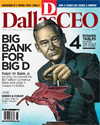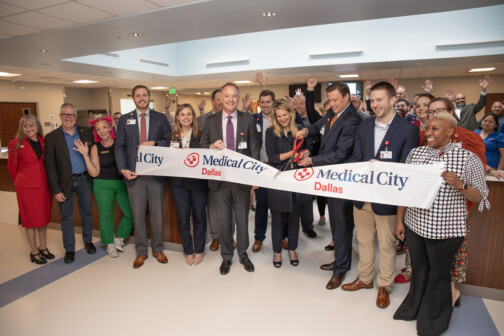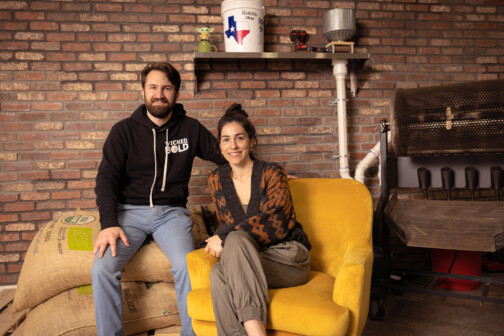 |
| ACTION: AMS CEO Andy Streitfeld has made big business from the small screen. photography by Jeremy Sharp |
Andy streitfeld, the lanky, 51-year-old CEO of Dallas-based AMS Production Group, is an overgrown kid in his own candy store, a disciple of Disney magic who openly admits to worshipping ABC’s Donny and Marie show as a teenager. Streitfeld has done it his way for nearly 25 years. His company’s slogan, “The Art of the Message,” is capitalized within a multi-colored, two-story corporate building that from the outside still looks like a movie theater from Tomorrowland.
“People pay us to be creative,” Streitfeld says from his office on the North Dallas Parkway. “We’re not doing widgets or accounting services. It’s very important to me that it’s an entire experience. We want to wow people when they walk in.
“It’s a premium service, too,” he adds. “You pay more to go to Disneyland than you do to visit Knott’s Berry Farm or whatever. And we charge more money because we have a higher level of service and creativity.”
AMS (the M is for his middle name, Mark) basically will run whatever obstacle course a client poses. That used to be mostly corporate training videos distributed on now primitive VHS tapes. And though AMS still produces those corporate videos, it has gone far beyond its early limited reach, producing commercials, TV series, documentary films, and lately, “Web original” programming.
Its first original documentary, 2005’s nationally televised The Power of Harmony, detailed the history of the Turtle Creek Chorale, a Dallas gay men’s chorus now in its 27th season. AMS’s Race Car Driver, a 14-part series, aired on Chicago “Superstation” WGN-TV.
The 75-employee company also got in on the ground floor of satellite technology and still does a wide array of live shots from ready-made studio sets. “Media tours” of 30 or more markets can be knocked off in three to four hours. Traveling celebrities also can originate their regular programs from AMS, or do a single live “newsmaker” interview on CNN, ABC, ESPN, etc.
| ›› THE TAKEAWAY |
1. A creative company needs stuff like accounting to stay alive. 2. Going public means more paperwork. 3. Anger management is not being more angry than you need to be. |
AMS has brought a little bit of Hollywood—not to mention Washington D.C.—to Dallas. The company’s “Wall of Fame” is autographed by the likes of Sam Donaldson, Sean Hannity, Randy Travis, Newt Gingrich, Johnnie Cochran, Mary Lou Retton, Gennifer Flowers, Oliver Stone, Pat Summerall, Mark Cuban, Dominic Purcell, Carl Weathers, Ben Stein, Boone Pickens, and Bill O’Reilly. (“This is a great place,” O’Reilly wrote. “Check out the kitchen!”)
In 1996—“A big growth period for us,” Streitfeld says—AMS produced all of H. Ross Perot’s commercials and live TV appearances during his pre-Internet Reform Party campaign for president.
“He would ride his bicycle to our studio,” Streitfeld recalls. “He was very casual and didn’t have a lot of pretensions—at least not with us. We’d come up with an idea, put it on tape the next day, edit it, and get it out. It just seems like 100 years ago now. Think about how much things have changed.”
AMS anticipates $12 million in billings this year. Not bad for a company that Streitfeld started in September 1982 in a spare upstairs bedroom while his wife, former KXAS-TV news anchor Carolyn Raiser, was pregnant with their first child. He started by dubbing VHS tapes, which led him to jobs with his first customers, Lennox Industries and the Dallas Museum of Art, which had big plans to build a downtown showplace.
“It’s not customary for the wife to get pregnant and the husband to quit his job to work at home,” Raiser says. “So yeah, I was a little nervous. But even in those early days there was never a time that the next job didn’t come along as the previous one was ending. Once it started, it was steady.”
A quarter of a century later, Streitfeld still powers AMS by giving it just enough gas to stay within posted speed limits. Steady growth is a must, but not at all costs.
“I’ve always run the business very conservatively,” he says. “Nothing would be scarier to me than ‘Oh, I’ve got to make payroll next week and I don’t have the money.’ A lot of people who go into business in the creative area treat it more like a hobby. But I learned accounting immediately because I wanted to understand a balance sheet. We’re very creative and we do unique things. But at our core, we’re very much a business.”
Streitfeld says he was “entrepreneurial” from an early age. “I really always saw myself running my own company,” he says.
But his wonder years were decidedly different from Kevin Arnold’s or Theodore “Beaver” Cleaver’s.
His mother, Virginia, is the sister of Paul Volcker, who was chairman of the economy-shaping Federal Reserve for eight years until giving way to Alan Greenspan in 1987. His father, the late Harold Streitfeld, had a decidedly unconventional mind of his own during the free-swinging 1960s and ’70s.
“[My dad] had a very strong Jewish mother, and he spent his whole life really trying to deal with and understand her,” Streitfeld says. “When she died, he went to the funeral home and yelled at her in the coffin. And he said, ‘That was the only time my mother ever listened to me.’ That says a lot about my father. He was always searching.”
The Streitfelds moved to Stamford, Conn., in the mid 1960s, where Harold Streitfeld founded the Aureon Institute, an East Coast equivalent of the much-publicized Esalen Institute in Big Sur, Calif. Andy, the middle of five children, used to videotape his father’s encounter group workshops and sessions.
“He loved the fact that I could do these things for him. It made me very proud,” Streitfeld says.
Young Andy also went with Dad during his guest appearances on the Mike Douglas and Dick Cavett shows, where celebrities such as Jonathan Winters, Roberta Flack, Joe Namath, and Ann-Margret joined him in ad hoc therapy sessions.
“He was kind of the East Coast’s first pop psychologist,” Streitfeld says. “You have to put yourself in those times. My dad had a loft in New York City, and on Friday nights they would do these drop-in encounters. One of them was a nude encounter, and I remember collecting money for it as a teenager. There were probably 40 naked people in front of me. They weren’t having sex. There was none of that. But a lot of that touchy-feely stuff started back then.”
His mother, far more reserved, “was an incredibly stable and nurturing person who encouraged me to take art and music classes as a kid,” Streitfeld says. “She was really the one that kept us on the right path.”
His parents divorced when he was 15, with neither ever remarrying. Andy eventually graduated from New York University with a degree in broadcasting. Watching Donny and Marie—“my absolute favorite show”—during those years had made him aspire to be a TV director. His first job was at the CBS affiliate station in Fort Wayne, Ind. While there, he moved up from crew person to director. More importantly, he met his wife, Carolyn Raiser, a weekend anchor and court reporter.
“He was kind of disarming. Nobody ever felt threatened by him,” Raiser says. “People would let him do stuff. It didn’t seem like he was playing the game. He was just there.”
They moved to North Texas when Raiser joined KXAS, where she anchored and reported until resigning in 1989 to spend more time with their three children.
Streitfeld first got a job with Sedco, an oil contracting company owned by then–Texas governor Bill Clements. For two years he traveled the world shooting training and marketing videos.
“It was great fun back when oil was kind of king,” Streitfeld says.
He then decided to take the plunge, borrowing $35,000 in start-up money for AMS from his grandmother, aunt, and youngest brother, David. His initial client, the Dallas Museum of Art, asked Streitfeld to produce a video for an El Greco exhibit. From the start, AMS grew steadily.
He soon got out of the house, renting warehouse space at KDFI-TV (Channel 27) back when it was still a paid-subscription TV service during nighttime hours. Streitfeld hired his first two employees before relocating to the Las Colinas Communications Complex, where AMS spent the next six years.
Another move, to a small building on Gamma Rd., took AMS through the 1996 Perot campaign. By that time Streitfeld had found the current property on Dallas Parkway. The company’s new, 40,000-square-foot showplace was built from the ground up and opened in 1998. Its interior has a “Main Street;” a TV diner; Santa Fe, Paris, and New York editing rooms among others; “Jodi’s Barber Shop” (the makeup room); and Egyptian-themed restrooms where Cleopatra silently plays on wide-screen television sets.
Near the building’s entrance, a continuously running, fake Fox News Channel report says the facility was constructed on ancient ruins where primitive arrowheads, animal teeth, and pottery were unearthed.
“I love architecture and the concept of design,” Streitfeld says. “I hate white walls and fluorescent lights, and I never wanted my business to be like that. … [Walt] Disney used to go to amusement parks, and they were not very well-run. There were guys with no teeth that ran the rides, and mud all over the place. So he built Disneyland. And this is kind of my homage to him.”
AMS has similarly themed but smaller studios in Austin, where the company’s been in business for the past six years.
Streitfeld rules both kingdoms firmly but benevolently, delegating responsibility and then stepping aside.
“I’ve learned about anger management from my father, so I’ve tried not to show any more anger than I have to,” he says. “I think it’s all about accountability. It’s hard for entrepreneurs to move away, because they want to micro-manage everything. But I realized very early on that there are other people who can do the job much better than I can.
“I’m not the best camera person, writer, or producer,” he adds. “My job is to grow the business and meet my clients, and motivate the staff. My job is not to produce videos.”
AMS’s Dallas headquarters also houses a 40-seat theater with a red, velvet curtain dressing the big screen. Lately there have been a growing number of “world premieres.”
Rising From the Rails, a history of the Pullman Porters, and Shock, based on the same-named book by Kitty Dukakis and medical reporter Larry Tye, were released on DVD last year. Woman Driver, another recent effort, looks at the professional racing career of record-breaking Katherine Legge.
“I want to do three or four documentaries a year,” Streitfeld says. “They’re not going to be highly profitable, but we do hope to break even on them. It’s really more of a personal and creative thing for me than a profit-making venture.”
One recently funded documentary in the works is Stop the Presses: The American Newspaper in Peril. It’s being produced and directed, on a $200,000 budget, by veteran Dallas-based filmmaker Marc Birnbaum and Manuel Mendoza, a former arts and entertainment writer for The Dallas Morning News who left the paper in September along with more than 100 staffers who took a buyout offer [This article’s writer was among them.—Ed.].
“When Andy ultimately built the AMS mothership, his inner Disney finally emerged,” Birnbaum says. “He’s been marshaling resources for quite a while, and now he’s got the wherewithal and the guts to underwrite independent documentary production. It’s a tough game if you’re not Discovery or HBO.”
AMS is on track to produce more than 150 hours of original programming for broadcast and Web this year, Streitfeld says. As the workload increases, Streitfeld plans to keep a modest payroll.
“I’ve never wanted to run a company with hundreds and hundreds of employees,” he says. “And I’d never want to be publicly owned, because I wouldn’t want to have to deal with all the paperwork and reporting stuff.”
In that respect he’s very un-Disney. No global visions or grandiose expansion plans are in the water at AMS. But that old Disney magic won’t ever leave him cold.
“I’ve always had a desire to create what I’d call a Walt Disney environment,” Streitfeld says. “This has never been a job to me. It’s my absolute passion. And I’ve enjoyed every minute of it.”
COMING SOON
In addition to an upcoming documentary on the imperiled newspaper industry, AMS has several major projects in the works. Among them:
Bodacious Boots.
A film on the history of the cowboy boot, featuring Lyle Lovett, Kinky Friedman, and other devotees.
In the Shadow of Hollywood. A history of “race movies” of the 1920s and ’30s to be narrated by Dallas-based national radio personality Tom Joyner.
High-definition series on yoga and pilates, each 65 episodes, for the new Veria health and wellness network.
Web stories for the new Condé Nast Portfolio business magazine’s Web site.
Ongoing work includes weekly commercials for Albertson’s as well as marketing and product videos for Frito-Lay.





